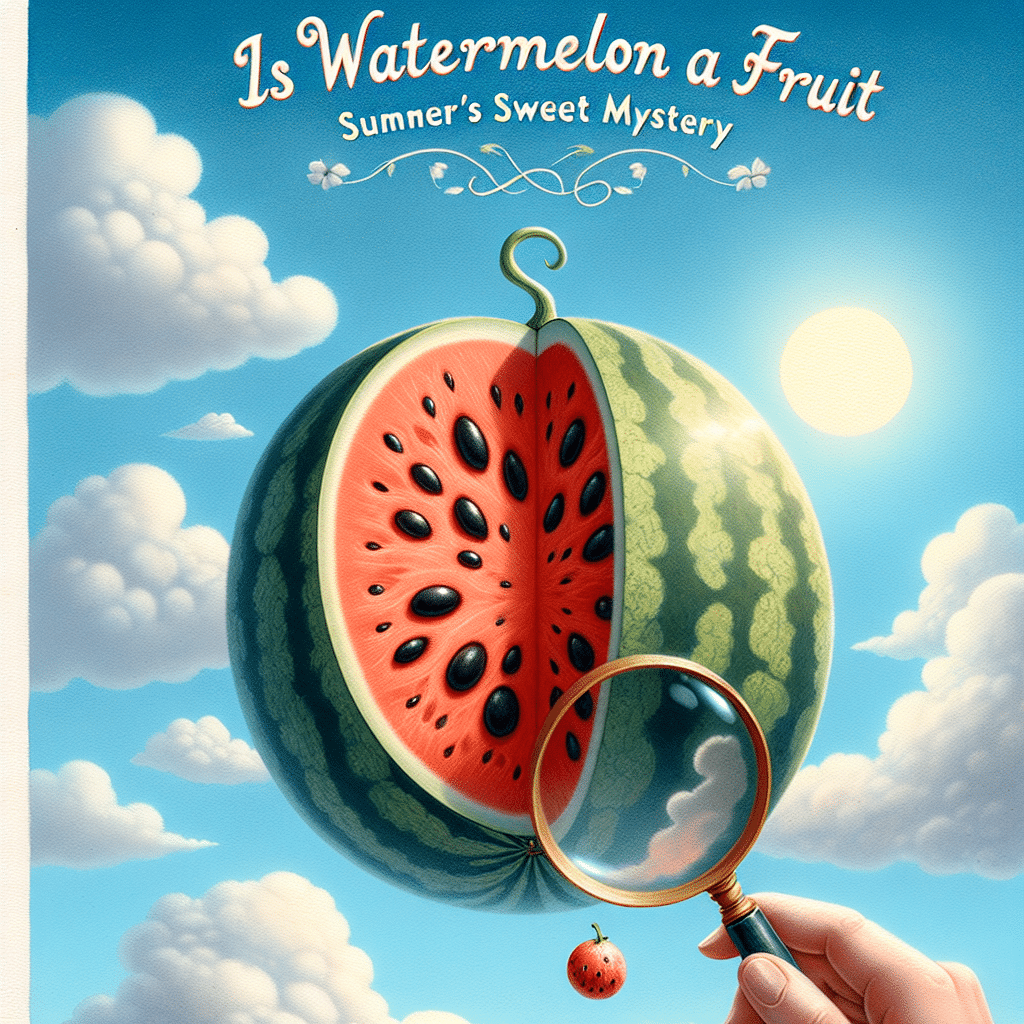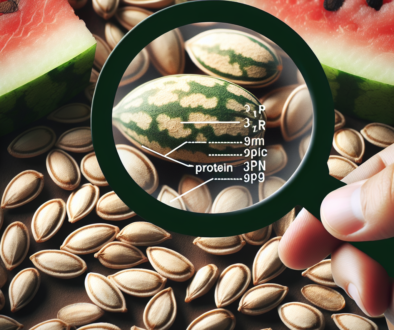Is Watermelon a Fruit: Summer’s Sweet Mystery
-
Table of Contents
- Watermelon: The Sweet Mystery of Summer’s Favorite Fruit
- Understanding the Botanical Basics
- Watermelon: A Fruit by Any Other Name
- The Cucurbitaceae Family: A Fruitful Lineage
- Culinary Classification: Fruit or Vegetable?
- Nutritional Profile of Watermelon
- Watermelon in Culture and History
- Conclusion: Embracing the Fruit of Summer
- Enhance Your Summer with ETprotein’s Watermelon Seed Protein
Watermelon: The Sweet Mystery of Summer’s Favorite Fruit

As the sun climbs higher and the days grow longer, the craving for refreshing and hydrating foods becomes almost instinctual. Among the many seasonal delights, watermelon stands out as a quintessential summer treat. But behind its juicy sweetness lies a question that has puzzled many: Is watermelon a fruit, or could it be classified as something else? This article delves into the botanical and culinary aspects of watermelon, unraveling the sweet mystery of this beloved summer staple.
Understanding the Botanical Basics
Before we can answer whether watermelon is a fruit, it’s essential to understand what defines a fruit from a botanical perspective. In the world of botany, a fruit is the mature ovary of a flowering plant, usually containing seeds. Fruits develop from the fertilized ovary after flowering and serve as a mechanism for seed dispersal.
Watermelon: A Fruit by Any Other Name
Watermelon, scientifically known as Citrullus lanatus, fits the botanical criteria for a fruit. It develops from the plant’s ovary after flowering and contains seeds that can give rise to new watermelon plants. Therefore, from a scientific standpoint, watermelon is unequivocally a fruit.
The Cucurbitaceae Family: A Fruitful Lineage
Watermelon belongs to the Cucurbitaceae family, which includes other well-known fruits such as cucumbers, pumpkins, and squashes. This family is characterized by its members producing fruits that are technically known as pepos—a type of berry with a thick rind and fleshy interior.
- Cucumbers: Often considered vegetables, cucumbers are botanically fruits.
- Pumpkins: Commonly associated with vegetables due to their savory applications, pumpkins are also fruits.
- Squashes: Both summer and winter squashes are classified as fruits, despite their frequent use in savory dishes.
Understanding that watermelon shares its family tree with these other “vegetables” helps clarify why there might be confusion about its classification.
Culinary Classification: Fruit or Vegetable?
In the culinary world, the lines between fruits and vegetables are not as clearly defined as they are in botany. Culinary classifications often depend on taste and usage in dishes. Fruits are typically sweet and used in desserts, while vegetables are more savory and used in main courses.
Watermelon, with its sweet flavor, is generally used in fruit salads, desserts, and as a refreshing snack, aligning it with the culinary definition of a fruit. However, in some cultures, watermelon is also used in savory dishes, which might lead to it being considered a vegetable in those contexts.
Nutritional Profile of Watermelon
Regardless of its classification, watermelon is a nutritional powerhouse. It is low in calories and rich in vitamins, minerals, and antioxidants. Here are some key nutritional benefits of watermelon:
- Hydration: Watermelon is composed of about 92% water, making it an excellent choice for staying hydrated during hot summer months.
- Vitamins: It is a good source of Vitamin C, Vitamin A, and several B vitamins.
- Minerals: Watermelon contains essential minerals like potassium and magnesium.
- Antioxidants: The presence of lycopene, an antioxidant, gives watermelon its red color and has been linked to various health benefits.
These nutritional attributes make watermelon not only a delicious summer treat but also a healthy one.
Watermelon in Culture and History
Watermelon has a rich history and cultural significance around the world. Originating in Africa, it has been cultivated for thousands of years. Ancient Egyptians valued watermelons, as evidenced by their depiction in hieroglyphics. Over time, watermelon spread to other parts of the world, including China, which is now the largest producer of watermelons.
In the United States, watermelon has become synonymous with summer and is often featured at picnics and barbecues. The fruit also plays a role in traditions such as watermelon-eating contests and seed-spitting games, adding to its cultural significance as a symbol of summer fun.
Conclusion: Embracing the Fruit of Summer
In conclusion, watermelon is indeed a fruit, both botanically and culinarily. Its classification as a member of the Cucurbitaceae family places it firmly within the fruit category, despite occasional savory applications. Beyond its classification, watermelon’s nutritional benefits, cultural significance, and refreshing taste make it a beloved summer staple. As we enjoy this sweet, hydrating fruit, we can appreciate the rich history and mystery that surrounds it.
Enhance Your Summer with ETprotein’s Watermelon Seed Protein
For those looking to add a nutritious boost to their summer diet, ETprotein offers a range of plant-based protein products, including watermelon seed protein. This unique protein source is not only derived from the seeds of summer’s favorite fruit but also provides a high-quality, vegan-friendly protein option.
ETprotein’s watermelon seed protein is perfect for smoothies, shakes, and other culinary creations, allowing you to enjoy the taste of summer while supporting your health and wellness goals. With ETprotein’s commitment to non-GMO, allergen-free products, you can trust that you’re getting the best plant proteins on the market.
Whether you’re a food and beverage manufacturer looking to innovate with new products or an individual seeking to enhance your protein intake with plant-based options, ETprotein has you covered. Embrace the power of watermelon and other plant proteins this summer and beyond.
About ETprotein:
ETprotein, a reputable watermelon seed protein Chinese factory manufacturer and supplier, is renowned for producing, stocking, exporting, and delivering the highest quality organic bulk vegan protein and plant proteins. They include Organic rice protein, clear rice protein, pea protein, clear pea protein, watermelon seed protein, pumpkin seed protein, sunflower seed protein, mung bean protein, peanut protein etc. Their offerings, characterized by a neutral taste, non-GMO, allergen-free attributes, cater to a diverse range of industries. They serve nutraceutical, pharmaceutical, cosmeceutical, veterinary, as well as food and beverage finished product distributors, traders, and manufacturers across Europe, USA, Canada, Australia, Thailand, Japan, Korea, Brazil, and Chile, among others.
ETprotein specialization includes exporting and delivering tailor-made protein powder and finished nutritional supplements. Their extensive product range covers sectors like Food and Beverage, Sports Nutrition, Weight Management, Dietary Supplements, Health and Wellness Products, and Infant Formula, ensuring comprehensive solutions to meet all your protein needs.
As a trusted company by leading global food and beverage brands and Fortune 500 companies, ETprotein reinforces China’s reputation in the global arena. For more information or to sample their products, please contact them and email sales(at)ETprotein.com today.












